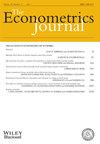Testing exogeneity in nonparametric instrumental variables identified by conditional quantile restrictions
IF 7
4区 经济学
Q1 ECONOMICS
引用次数: 2
Abstract
This paper presents a test for exogeneity of explanatory variables in a nonparametric instrumental variables (IV) model whose structural function is identified through a conditional quantile restriction. Quantile regression models are increasingly important in applied econometrics. As with mean-regression models, an erroneous assumption that the explanatory variables in a quantile regression model are exogenous can lead to highly misleading results. In addition, a test of exogeneity based on an incorrectly specified parametric model can produce misleading results. This paper presents a test of exogeneity that does not assume the structural function belongs to a known finite-dimensional parametric family and does not require nonparametric estimation of this function. The latter property is important because, owing to the ill-posed inverse problem, a test based on a nonparametric estimator of the structural function has low power. The test presented here is consistent whenever the structural function differs from the conditional quantile function on a set of non-zero probability. The test has non-trivial power uniformly over a large class of structural functions that differ from the conditional quantile function by O(n-1/2) . The results of Monte Carlo experiments illustrate the usefulness of the test.检验由条件分位数限制确定的非参数工具变量的外生性
本文提出了一个非参数工具变量(IV)模型中解释变量的外生性检验,该模型的结构函数是通过条件分位数限制来识别的。分位数回归模型在计量经济学应用中越来越重要。与均值回归模型一样,分位数回归模型中的解释变量是外生的错误假设可能导致高度误导性的结果。此外,基于不正确指定的参数模型的外生性检验可能会产生误导性的结果。本文提出了一种外生性检验,它不假设结构函数属于已知的有限维参数族,也不需要对该函数进行非参数估计。后一个性质很重要,因为由于不适定逆问题,基于结构函数的非参数估计量的检验具有低功率。当结构函数与条件分位数函数在一组非零概率上不同时,本文给出的检验是一致的。该检验在与条件分位数函数相差0 (n-1/2)的一大类结构函数上具有非平凡幂。蒙特卡罗实验结果说明了该方法的有效性。
本文章由计算机程序翻译,如有差异,请以英文原文为准。
求助全文
约1分钟内获得全文
求助全文
来源期刊

Econometrics Journal
管理科学-数学跨学科应用
CiteScore
4.20
自引率
5.30%
发文量
25
审稿时长
>12 weeks
期刊介绍:
The Econometrics Journal was established in 1998 by the Royal Economic Society with the aim of creating a top international field journal for the publication of econometric research with a standard of intellectual rigour and academic standing similar to those of the pre-existing top field journals in econometrics. The Econometrics Journal is committed to publishing first-class papers in macro-, micro- and financial econometrics. It is a general journal for econometric research open to all areas of econometrics, whether applied, computational, methodological or theoretical contributions.
 求助内容:
求助内容: 应助结果提醒方式:
应助结果提醒方式:


